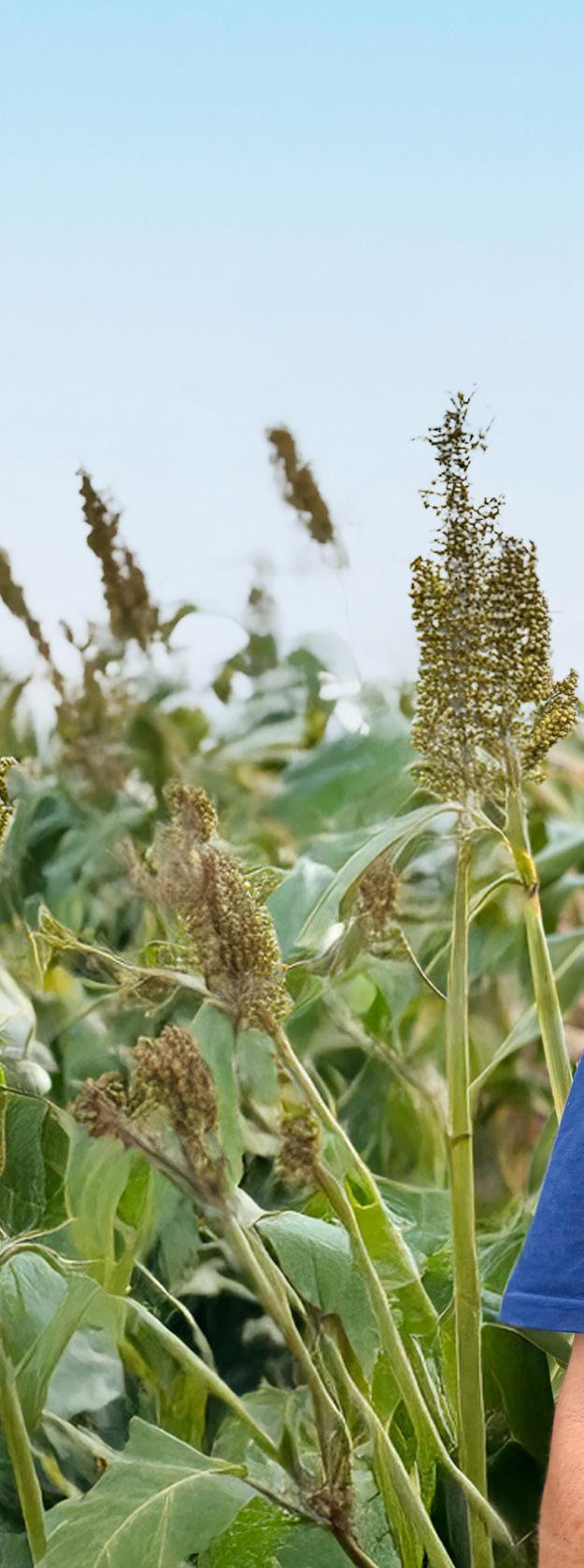CULTIVATING CLIMATE RESILIENCE IN ZIMBABWE
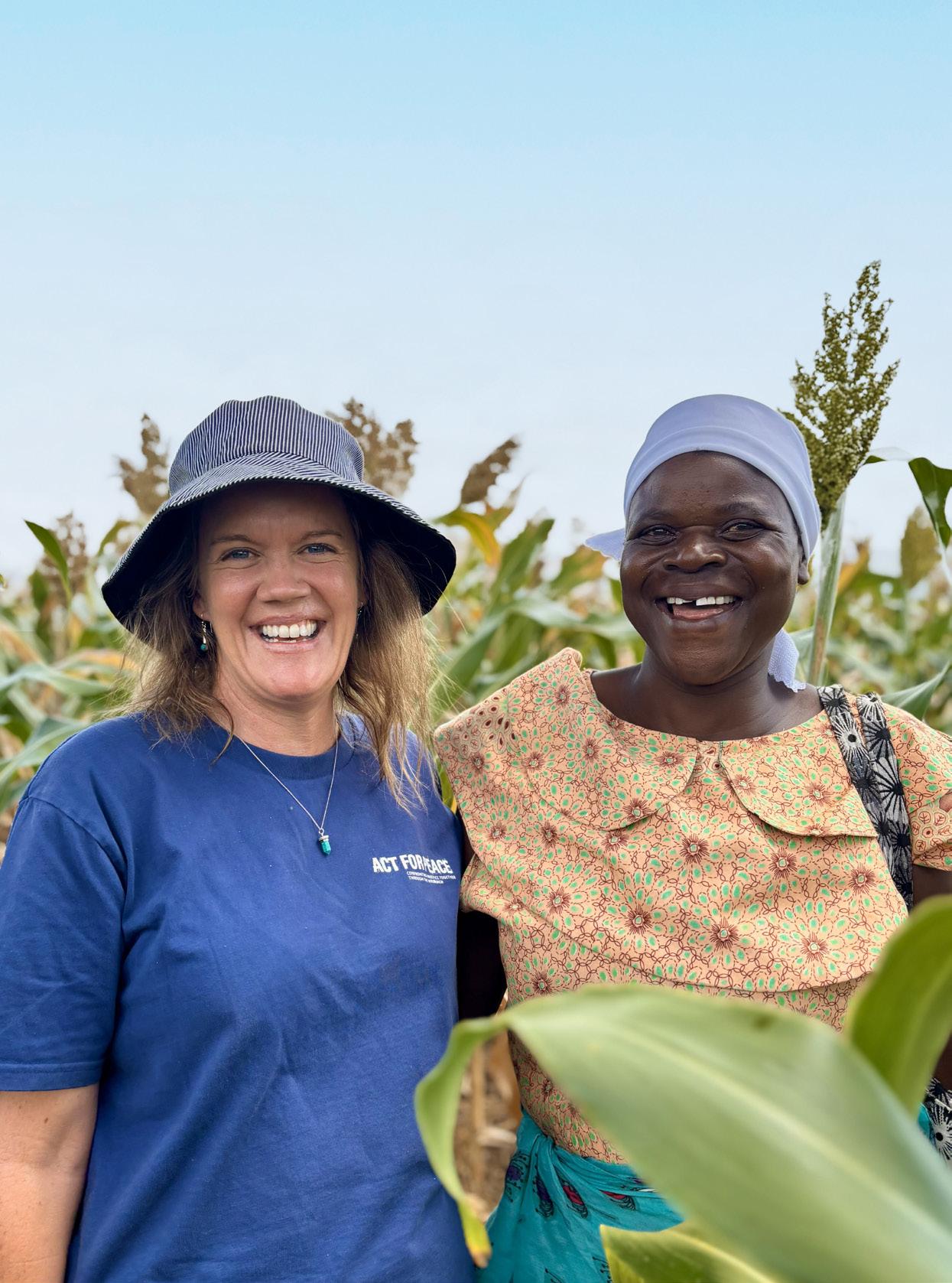
MAGAZINE | WINTER 2025

CULTIVATING CLIMATE RESILIENCE IN ZIMBABWE

MAGAZINE | WINTER 2025
PATHWAYS OUT OF POVERTY IN ETHIOPIA
ENSHRINING REFUGEES’ RIGHTS IN LAW
ECUMENICAL ACCOMPANIERS IN PALESTINE & ISRAEL

Tsehay* radiates joy. Her story is the definition of transformation – thanks to the practical, long-term solutions provided by the Tesfa program.
Tesfa means ‘hope’ in Amharic language, and in the Ethiopian capital where Tsehay lives with her family, this program, facilitated by our local partner, Ethiopian Orthodox Church – Development and Inter Church Aid Commission (EOC-DICAC), is helping to provide hope through a holistic, sustainable pathway out of poverty.
When Tsehay first joined the Tesfa program, she struggled to earn a reliable income and felt hopeless.
“Before the project, I didn’t even have clothes to go out, so I never went out.” says Tsehay.
“I used to struggle to feed my children or even to buy them bread. I was about to go and live on the street right before Tesfa came, because I couldn’t afford rent.” - Tsehay
But everything changed when she joined the Tesfa program. Tsehay received coaching, support and training in finances, life skills, business and technical skills. With support and encouragement from her program mentor, Yengusnesh, she began training in hair and beauty so she could secure a reliable job.
The salon she trained at was so impressed with her dedication she was offered employment.
“I am a changed person. I’m very happy.”
For Tsehay, the social connections and support she received through Tesfa helped grow her confidence and expand her social networks, even helping to break down negative cultural barriers.
“I’ve learned a lot from that [savings] group, being able to speak to other women,” she explains.
“I never interacted with Eritrean people – I had negative views on them, but through the project, I’ve spent time with Eritrean women and now they are like sisters to me.”
The dedication and support she received from her program mentor, Yengusnesh, helped Tsehay believe in herself and hope for a brighter future.
“What she gave me was hope – that things could change, that life could be different. It’s more than

having food – having someone who believes in you and supports your dream.”
Now her dreams are coming true, Tsehay wants to pay it forward and help other women.
“I aspire to be like her [Yengusnesh]. I aspire to take a woman out of poverty and help a woman build her confidence. And I want to be someone that a woman looks up to. I would like to thank the Australian supporters… for helping take me out of poverty and for changing my life.”
“You have changed my life. And may God return what you have done for me to you.” - Tsehay
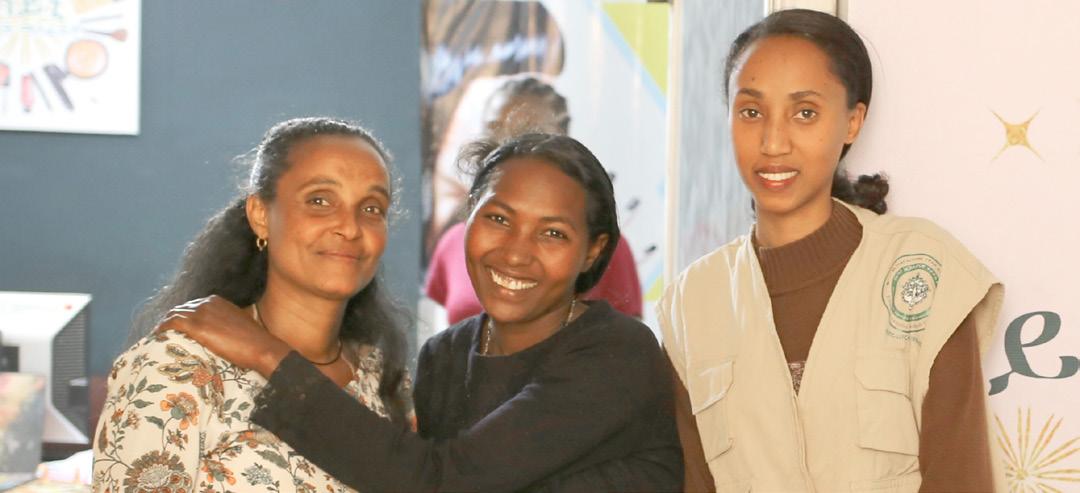
Act for Peace is committed to amplifying the voices of people who are displaced as key to facilitating a truly locally led approach.
Brian Barbour, Act for Peace Senior Refugee Protection Advisor, is currently campaigning to enshrine refugees’ right to participate in international law and policy reform.
This work is being led hand-in-hand with refugee-led organisations. The Asia Pacific Network of Refugees (APNOR), one of the coleading partners in the current global working group on meaningful refugee participation, brings deep lived experience and grassroots leadership to the effort.
“Refugees don’t just need a seat at the table—we need to build our own table. We are no longer asking to be included— we are already leading.” - Najeeba Wazefadost, former refugee and Executive Director of APNOR
At the inaugural Global Refugee Forum (GRF) in 2019, governments, international institutions, private sector stakeholders, non-government organisations and refugees came together as part of a global action planning process.
From this first GRF, Act for Peace, together with the Asia Pacific Network of Refugees (APNOR), the Asia Pacific Refugee Rights Network (APRRN), and the Global Refugee-Led Network (GRN) worked together to create pledges on the meaningful participation of refugees in decision-making.
Since then, over 50 stakeholders have committed to the pledge, including the Australian government as well as Canada, the US, the Netherlands, Germany and Denmark. The pledge has very tangible outcomes. Australia now has a Refugee Advisory Committee made up of refugees who advise the government on policies and programs. But in order for this pledge to have concrete outcomes, the progress needs to be cemented within a legal framework.

“I want to help my community because, as fellow human beings, they are entitled to basic human rights.”- Mu Taw
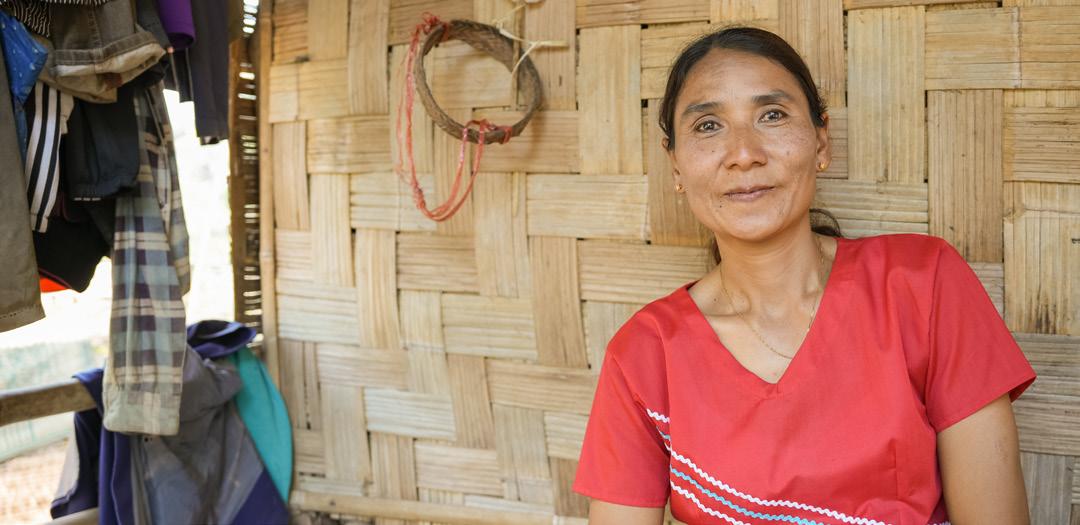
Mu Taw has been living in a refugee camp on the Thai Myanmar border for the past 17 years. Supported by local partner The Border Consortium, the camp is a prime example of the value of a locally led approach in meeting the needs of refugees by refugees. Driven by determination to serve her community, Mu Taw was elected by camp members to be the vice chairperson for the Camp Committee. Camp committee members (who live at the camp) facilitate refugees leading activities that ensure their own safety, dignity and rights.
In response, a global working group was established, co-led by Act for Peace, the Asia Pacific Network of Refugees (APNOR) and the Kaldor Centre for International Refugee Law at the University of New South Wales.
This team of 12 refugee leaders and eight academic/legal experts has developed a consultation draft of a declaration on refugees’ rights to meaningful participation.
The working group has finalised a ‘consultation draft’, which went out for global consultation in June. The group then hopes to work alongside UNHCR to develop an Executive Committee Conclusion on Meaningful Participation.
This would be the start of law reform at the global level. Simultaneously, efforts will be made at the regional, national and local levels in many contexts around the globe, making sure that refugees have a right to participate in all the decisions and programs that affect them.
According to Brian, there is universal agreement on refugees’ rights to participate in theory, but
the declaration is an important step to ensuring those rights are respected in practice.
“What we want to do is move from rhetoric to rights. Everyone agrees that meaningful participation is important,” says Brian.
“But those are just words. It doesn’t ensure that anything is going to happen in practice. What we want to do is to operationalise that. We want it to be implemented in practice.”
If the declaration is adopted, Brian hopes this will mean that refugees will have a seat at the table in decision-making contexts, be involved in service delivery, and part of all coordination bodies.
You can read the full article and Draft Declaration and share your feedback on our website, just scan the QR code.

actforpeace.org.au/declaration
Find out how our partnerships are helping communities regain and retain a safe place to belong.
Tracey Robinson, Act for Peace International Programs Manager, recently visited two local partners in Zimbabwe and saw firsthand how Act for Peace supporters are helping communities become more resilient to the impacts of climate change.
During her visit with Christian Care Zimbabwe and Zimbabwe Council of Churches, Tracey saw the impact of long-term programs, including climate-resilient farming, wetland regeneration, and community gardens.
One of the most rewarding experiences of her visit was seeing Jane again.
Our supporters may remember Jane from our Christmas Bowl campaign last year. Tracey met Jane three years ago when she first came to Chimanimani community after she was displaced by Cyclone Idai. She had lost everything – her home and her three children who were killed in the disaster. She lived in a tent for two years and was one of 700 families relocated to the Chimanimani region where she later welcomed the birth of her new child.
When she was first relocated, Jane didn’t have access to water at her home, but Zimbabwe Council of Churches (ZCC) started a new water scheme, and she now has a standpipe and tap at her home.
Before, she had to travel to collect water, but with water at home, her garden is flourishing, and Jane can provide water for her chickens, improving her access to food and increasing her income.
Jane has also found deep connection and purpose in her new home. She has become best friends with her neighbour, Margret, and the two

women support each other with their farming. They have joined their plots together, and they grow different types of food and raise chickens together. Jane has also trained to become the community plumber.
“I am a plumber now after going through workshops and training on how to handle the water reticulation and connectivity, so whenever a problem arises, I know how to fix it,” says Jane.
“I am the chairperson of the waterpoint committee now. I’m the leader - so when there is no water, people report to me.”
For Tracey, seeing the transformation in Jane’s life, because she now has a safe place to belong, is something she will never forget.
“She’s so proud of herself that she has those skills and she’s needed in the community,” says Tracey.
“Jane has a sense of purpose and place, so she’s no longer feeling lonely and abandoned, and she can now provide for her child.” - Tracey
While conflicts in the Middle East occupy news headlines globally, behind the war and humanitarian crises, local organisations are leading the way seeking peace and providing hope where it’s needed most.
The ACT Alliance Middle East and North Africa (MENA) Forum Annual Meeting was recently held in Amman, Jordan. Faith-based NGOs shared challenges, opportunities and updates.
They discussed the current geopolitical situation in Egypt, Jordan, Palestine, Iraq and Syria, working with vulnerable communities, and addressing challenges including regional youth unemployment.
They also facilitated sessions on gender in emergency, localisation and the challenges of the future of Christians in the Middle East.
“While the region faces huge challenges, it is encouraging and inspiring to see the dedication and passion of locally led organisations which continue to make great progress,” says Act for Peace Program Manager, Trish Manley, who attended the Forum.
As an ACT Alliance Member, Act for Peace is committed to continuing to support the work of member organisations in the region, including in Gaza. Through the ACT Alliance, Christian Aid is supporting local partners in the Middle East which are deeply rooted in their communities. According to George Majaj, ACT Alliance Regional Representative MENA, the important work continues.
“ACT members in the Middle East are working in a very difficult situation but are managing to do great work, with many modifications to humanitarian planning to adapt to the changing security situation and constant monitoring of safety issues,” says George.
“The Secretariat is inspired by all the work they are doing and each organisation’s passionate commitment. Through this appeal, donors are supporting lifesaving assistance.”
If you would like to support ongoing work in the Middle East, you can give to our appeal by scanning the QR code or visiting actforpeace.org.au/middle-east
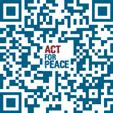

“No one is benefiting from these wars and it is always the innocent who pay the price.” - Nina*
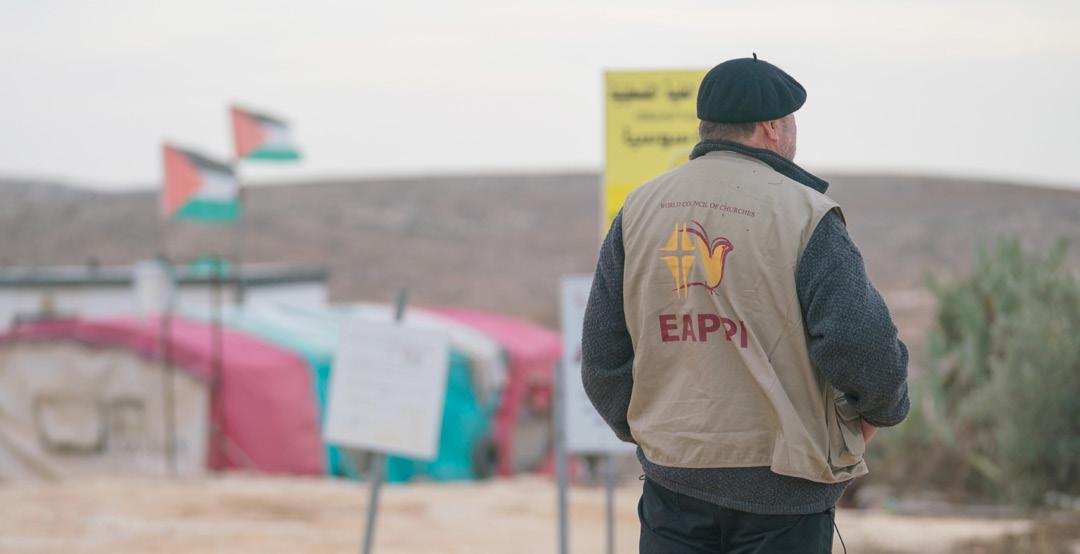
An Ecumenical Accompanier in a Bedouin village in the South Hebron Hills.
Every day, persecution and human rights abuses destroy people’s lives and fuel conflict in the Holy Land. The Ecumenical Accompaniment Program in Palestine and Israel (EAPPI) helps confront these injustices.
Recently, seven dedicated Australians spent five days learning what it takes to be an Ecumenical Accompanier (EA). The participants were trained in preparation for the possibility of deployment through EAPPI, where they could spend three months living alongside communities under military occupation to support local civil society organisations including Palestinian and Israeli human rights defenders.
The training involves sessions on the principles of nonviolence, principled impartiality and the practice of protective accompaniment, international humanitarian law, communication skills and dealing with team dynamics, the
fundamentals of fundraising, awareness raising and advocacy.
Nina* was an EA in 2024 and shares some of her experience as a human rights defender.
As a fellow human being, my empathy and compassion for the oppressed and advocacy for a just society is what inspired me.
I am beyond heartbroken to see and read about the situation of many children in Palestine, the painful reality for women, elderly and civilians, in general.
The ongoing war has only made the situation worse and calls for more support and solidarity. And to be able to make a difference – that’s what EAPPI is for.
Q What would you do on a normal day during deployment?
We had our daily schedule planned ahead. We would always leave the placement house at least in pairs for our daily activities.
I would join my team mate and we would accompany children on their way to school in East Jerusalem or in a Bedouin community in the West Bank.
We would then go for a ‘protective presence’ walk in the Old City Jerusalem followed by monitoring at Al Aqsa Mosque at its different entrances. (Protective presence is an EAPPI term used to describe being a visible presence in the area to improve protection of citizens).
If we received any news on demolitions/evictions, we’d prioritise that and re-schedule accordingly. We had meetings with community leaders scheduled on specific days of the week and a team would attend those.
During the olive harvest season, we did volunteer picking olives with Palestinian farmers. After coming back to the placement house, we’d have snacks/meal and sit for report writing.
Q What was the hardest thing you experienced?
I was picking olives at Tent of Nations in Bethlehem. I heard the bombings at six different times that day, those bombings from Gaza.
It is devastating, I can only imagine how life must be for people living in Gaza under constant bombings with thousands of children, women, and civilians killed, the food and medical supply shortages, the blockade of aid supplies, and facilities destroyed.
Q How did the program change you?
It definitely motivated me even more to advocate for a just society and peace.
No one is benefiting from these wars and it is always the innocent who pay the price.
*Names changed to protect privacy.
Q Do you think EAPPI is making a difference? How?
I think it is. Every three months, there are people like me from different countries in the world deployed by this program, and they raise awareness and create momentum in their immediate circle of influence. There are times when community people express their frustrations towards the international community that the world is silent while they are dying every day, however, they do appreciate the EAPPI program and welcome the EAs to visit them and listen to their stories and spread the word to the world.
Q Why is being a peacemaker important to you?
We need peacemakers, more than ever… as many as possible.
“The world needs more peace-loving people. I cannot help but try my best as a peacemaker, however big or small the impact I can make.”

An Ecumenical Accompanier (EA) visits a family that lives in tent house nearby to an Israeli settlement, providing protection through an international presence.
Thanks to your kind support, together we’re helping people displaced by conflict and disaster to have the peace of a safe place to belong.
Whether you supported an appeal or simply shared our mission with others, thank you. Here are some of the ways your support is changing lives:
As conflict continues to escalate in the Middle East the need for humanitarian aid has never been more urgent. Hundreds of thousands of people have been forced to flee their homes in search for a safe place to belong.
Your generous support is helping our local partners in the region, such as Christian Aid, respond to the humanitarian crisis providing life-saving emergency assistance such as food and health care.
Katie Roxburgh, Programme Officer, Israel & the occupied Palestinian territory at Christian Aid shared the following:
“Christian Aid’s local partners in Gaza are deeply rooted in their communities and have been the first responders to this humanitarian crisis, and continue to provide lifesaving assistance to communities in need.
“Our locally-led approach has meant that people and communities have been supported to help themselves, in the absence of a lasting ceasefire and sufficient aid entering the strip.”
Our partners have shown incredible adaptability and innovation, including through food, water, medical and shelter support. They are using what is available to them, including local farmers producing fruit and vegetables to distribute to the most vulnerable, rehabilitating destroyed
wells for water supply and teachers setting up makeshift classrooms in shelters for children’s education.
Each organisation’s deep commitment to humanitarian action is demonstrated every day through every effort to get support to communities in need - it is nothing short of humbling and inspiring. By supporting local organisations in Gaza, donors are providing lifesaving assistance to those who need it most.”
Funds are deployed through the Act Alliance network of local organisations in region to provide emergency assistance.


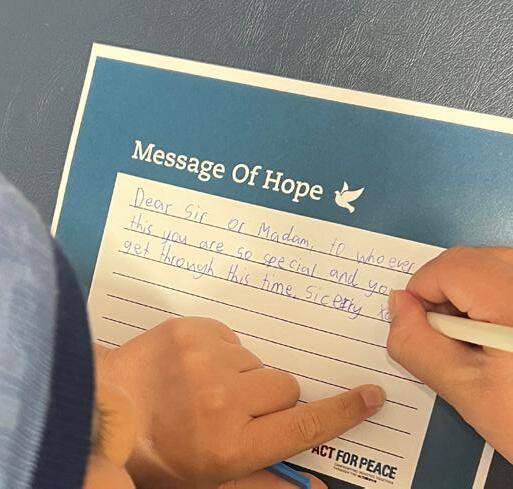
During Refugee Week in June, young people across the country embarked on the Ration Challenge to raise funds to help refugees rebuild their lives.
The Ration Challenge empowers young people to take practical action and become advocates for change while developing empathy for others.
At the time of print, collectively the schools and youth groups have raised over $160,000 so far which will provide life changing support for refugees and communities uprooted by conflict and disaster around the world.
Thank you to every school, student and youth group who took part – you’re inspiring a generation of changemakers!
Did you know you can create lasting change for people displaced by conflict and disaster by leaving a gift in your Will?
People who are without the peace of a place to call home. Gifts in Wills fund vital humanitarian programs that help people rebuild their lives.
To find out more about how you can act for peace through a Gift in your Will, scan the QR code or visit actforpeace.org.au/gift-in-will

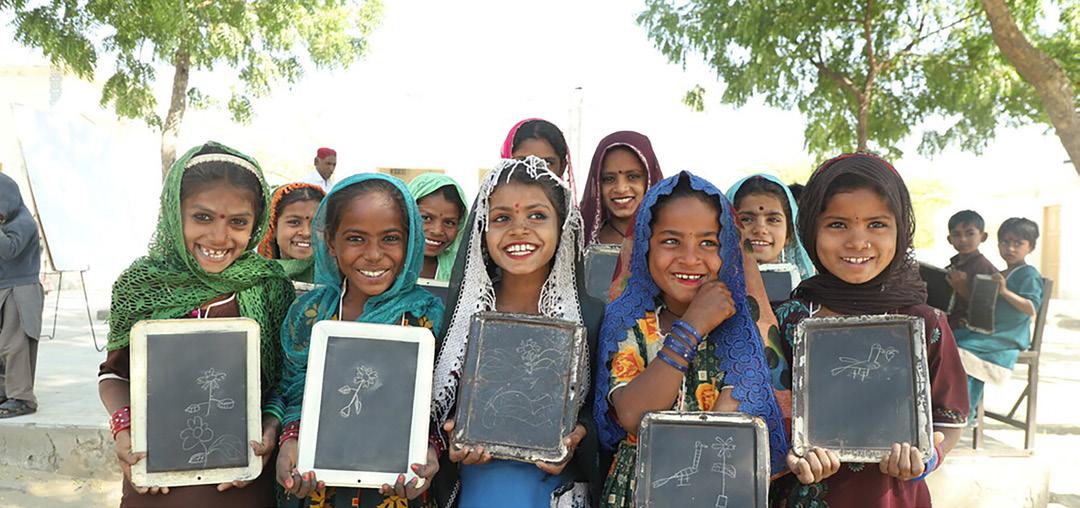

Girls in Pakistan have access to education thanks to supporters.
Cover image: In Zimbabwe, Act for Peace International Programs Manager, Tracey Robinson met many program participants like Anna (pictured) in the Bikita community who are part of the conservation farming program. Their crop yields have significantly improved thanks to this climate-resilient farming approach, which teaches community members to move away from traditional farming techniques and follow a more modern approach that uses less water and fewer seeds, and produces much higher yields.
Act for Peace, Locked Bag Q199, Queen Victoria Building NSW 1230 CALL 1800 025 101 EMAIL info@actforpeace.org.au Facebook.com/actforpeace Instagram.com/actforpeace Linkedin.com/company/act-for-peace
